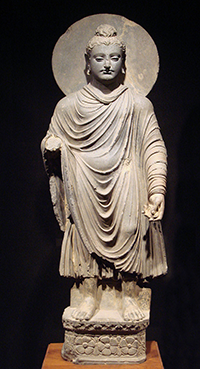 If you study philosophy from different parts of the world for any length of time, you will eventually run into ideas that seem remarkably similar. The next logical question then becomes, “Did one philosophical tradition influence the other, or did this concept arise spontaneously in two cultures separated by both space and time?”
If you study philosophy from different parts of the world for any length of time, you will eventually run into ideas that seem remarkably similar. The next logical question then becomes, “Did one philosophical tradition influence the other, or did this concept arise spontaneously in two cultures separated by both space and time?”
This sort of transcultural overlap is apparent when you look at the writings of the Greek philosopher Pyrrho of Elis, who traveled to India with Alexander the Great around 326 bce, and on his return founded the school of Skepticism. But while he was there, he observed the religious ascetics living indifferently to their circumstances.
Perhaps inspired by this indifference—or equanimity—Pyrrho later wrote, “Our senses and our language cannot be trusted, they cannot communicate truth, they cannot communicate falsity.”
According to Pyrrho, because our sense perceptions are inherently unreliable, the best way forward is to suspend all judgment and to live according to reality as it appears. This neutral position of accepting things as they appear echoes the famous tetralemma by the Indian Buddhist philosopher Nāgārjuna, the best-known member of the Mādhyamika school in the Mahāyāna Buddhist tradition. Pyrrho’s idea also shows up in the early canonical texts of Buddhism.
In an interview with Tricycle, Buddhist teacher Stephen Batchelor phrases Nāgārjuna’s tetralemma as: “We need to recognize that things no more are than they are not, that they neither both are and are not, and they neither “are” nor “not are”.
For Nāgārjuna, the effort of rejecting the thesis and its negation—and their combination—formed an important part of the Middle Way. For Pyrrho, allowing the mind to rest in radical uncertainty—or unknowing—can lead to aphatos, which means speechlessness. This, in turn, will give rise to ataraxia—untroubledness, or what might also be viewed as a deep peace.
The similarity between the philosophical ideas from these two cultures is remarkable. But whether Pyrrho picked up this idea from the Buddhists, or whether it had been developing in Greece before Alexander embarked for India, Pyrrho—like the Buddhists—put this concept into practice by using it to radically change how he lived in the world.













